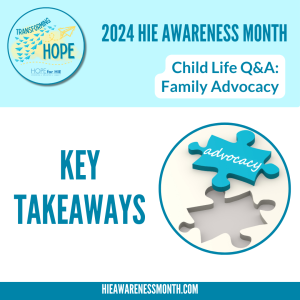
Advocacy is important; there’s no doubt about it. But let’s face it: putting it into action can be hard, especially when navigating the complexities of medical care. Between emotions running high, the need to digest large amounts of not-so-easy-to-understand information, and the pressure to make quick but responsible decisions, it’s totally normal to feel overwhelmed. Plus, add in the uncertainty, fear, and exhaustion that often accompany the journey, and advocating for your loved ones can turn into something we’re great at preaching but need help practicing.
That’s why Annie Gunning, Hope for HIE’s certified child life specialist, recently participated in a Q&A session aimed at equipping parents with valuable tools, strategies, and resources to help them advocate for themselves and their family members.
Read on for access to Annie’s expertise and toolbox of resources!

In her role as the Child Life Specialist at Hope for HIE, Annie’s main objective is to help children and families navigate medicalized life. She focuses on empowering and supporting both children and their caregivers, fostering the ability to advocate for their needs while simultaneously reducing stress, pain, and anxiety. This often looks like support for patients and their families facing surgeries, tests, procedures, diagnoses, and hospitalizations by offering preparation, creating personalized coping plans, providing education, fostering creative expression, and incorporating medical play.
If you’re looking to seek the services of a Child Life Specialist in a hospital setting, check with the hospital’s healthcare team! You can reach out to the child life department, pediatric unit, or patient services to inquire about the availability and services provided by a Child Life Specialist, or you can see if your hospital has information on its website regarding the roles and contact details of its dedicated CCLS.

A child life specialist’s mission has many pillars — collaboration and communication, education, individualization, emotional guidance and validation, and inclusion and connection, to name a few. But at the heart of it all is their desire to help parents and caregivers understand the power of their voices when advocating for themselves and their loved ones.
CLSs cultivate an environment of mutual respect and shared decision-making for parents and the healthcare team. They are trained to effectively engage in open dialogue, identify issues, and tailor solutions that address each family’s unique circumstances and comfort levels.
It’s probably safe to say that we’ve all had those Charlie Brown moments in a medical setting — we want to understand what the clinician is saying, but all we hear instead is wah, wah, wah. CLSs can help with that. They are trained to educate about medical procedures, treatment options, and available resources, and they can do so in a digestible manner. They can also show parents how to participate in rounds, share preferences, and become active partners in their child’s care journey.
Not to mention, hospitals can also seem like labyrinths with intricate procedures and protocols. A CLS is an excellent guide in these moments: they help parents navigate the system, access support services, and secure the necessary resources for their child’s well-being.
CLSs know that every family’s journey is distinct, so they are well-trained in providing personalized support and guidance. Whether it’s understanding medical procedures, navigating treatment options, or accessing support resources, their interventions are tailored to meet each family’s unique needs and circumstances. In the end, they help you find ways to follow through with what you know is best for your child, like getting their blood drawn while under anesthesia as opposed to later when awake.
Advocacy, while a wonderful tool, can be emotionally taxing. CLSs offer emotional guidance and coping strategies to help caregivers maintain their well-being while advocating for their child’s needs, and they can help you with self-care strategies—big or small!
A CLS helps the whole family, not just the patient. They find ways to encourage the inclusion of family and friends for support; they love working with siblings, for instance, to help them identify their own gifts and unique roles within the family.
Sometimes, parents and caregivers don’t know where to turn for support, but CLSs can utilize their global/local networks to connect them with peers and other community resources.

Just because they are children doesn’t mean they can’t demonstrate agency and ownership in their medical decision-making; rather, how we approach it has to be tailored to their development.

Annie understands that this can add another level of complexity, but she wants every parent and caregiver to know that there are still effective ways to encourage advocacy in a child who is non-verbal or who is too young to have the skills to communicate their preferences or fears.

It’s a lot to carry the responsibility of your medically complex child and the well-being of their siblings on your shoulders, and you don’t have to do that alone.
➡️ A CLS can work with your child in the hospital with coping, connection, and medical education, but they can also help you find moments for meaningful sibling engagement: they can facilitate sibling visits, and in moments where that’s not entirely possible, they can offer virtual or asynchronous bonding activities to keep them and the whole family connected throughout their absence.
➡️ They can also facilitate community support – finding ways for their teachers and schoolmates to stay connected or establish connections with peers in similar circumstances.

From a CLS perspective, what other universally helpful supports or resources can our HIE families utilize?
Want to listen to a CLOC podcast episode but need help figuring out where to start? Here are some popular episodes among our HIE community members to ease your search:
Watch the full recording, along with our other Child Life Q&As, on Hope for HIE’s YouTube channel under the Child Life Series playlist, or download our Key Takeaway resource for an at-a-glance look at how to help your kids cope during a dental appointment or procedure!
Connect with families, read inspiring stories, and get helpful resources delivered right to your inbox.